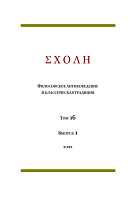“ИСКУССТВО И ЖИЗНЬ”: ЭСТЕТИЧЕСКИЙ ПЛАТОНИЗМ ОСКАРА УАЙЛЬДА
“ART AND LIFE”: OSCAR WILDE’S AESTHETIC PLATONISM
Author(s): Irina ProtopopovaSubject(s): Philosophy, Aesthetics, 19th Century Philosophy, 19th Century
Published by: Новосибирский государственный университет
Keywords: Wilde; Plato; Oxford Platonism; aestheticism; art; imitation;
Summary/Abstract: The article examines the Platonism of Oscar Wilde, starting from his studies at Trinity College and Oxford, and how it was related to his aestheticism. Plato was one of the key figures for the so-called Oxford Hellenistic movement (1850–70s of the 19th century). In its context, the “Symposium” was read almost as a manifesto of a new aestheticism, an important part of which was homoeroticism. Wilde believed that Plato should be interpreted as a “critique of Beauty” and compared a philosopher of the Platonic school with a poet. At the same time, considering himself a Platonist, Wilde turned Plato upside down. The metaphor of the “Cave” remained relevant to him as well, and the Cave itself was understood in about the same way, viz. as a vulgar sensual life with its senseless utilitarianism, taking shadows for genuine reality. But while for Plato the exit from the Cave was associated with pure comprehension in the rarefied and, most importantly, extra-figurative space of merging oneself with the transcendent, and attaining genuine virtue by this outlook for genuine reality, for Wilde, the beautiful in itself was imagery par excellence (according to Plato, the world of eidolons, the lowest sphere of being), and imagery was art, and the possibility of virtue according to Wilde is precisely fidelity to art.
Journal: ΣΧΟΛΗ. Философское антиковедение и классическая традиция
- Issue Year: XVI/2022
- Issue No: 1
- Page Range: 254-264
- Page Count: 11
- Language: Russian

